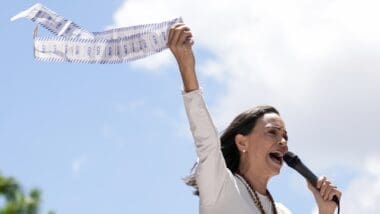In a surprising turn of events, the United Nations human rights watchdog has stepped in to investigate Venezuela’s presidential election amid allegations of widespread fraud. This move comes after serious claims that President Nicolás Maduro’s victory in the recent election was not as legitimate as it appears.
The U.N. Human Rights Council recently announced its decision to delve into these allegations, emphasizing the importance of preserving electoral materials, such as tally sheets, to ensure transparency in the investigation. The council’s move was prompted by a letter from several Latin American jurists who highlighted extensive evidence pointing to electoral malpractice that undermines the political rights of millions of Venezuelans.
Maduro, confident in his victory, claims to have won the July election by a significant margin. However, doubts loom as Venezuelan electoral authorities have not released the voting records to substantiate Maduro’s claims, a practice they had previously adhered to. This lack of transparency has sparked calls from the U.S., European Union, and even Maduro’s allies in Brazil, Colombia, and Mexico, urging the release of the records.
Interestingly, the opposing forces in Venezuela have countered Maduro’s claims by publishing what they assert are real tallies from 80% of the polling machines. These records suggest that their candidate, Edmundo González, was the true victor, winning by more than a two-to-one margin. This revelation further intensifies the debate over the election’s legitimacy.
The accusations extend beyond just ballot counting. Allegations have surfaced accusing Maduro’s officials of committing human rights violations. These include restricting the voting rights of Venezuelans abroad, proclaiming false results, and blocking judicial challenges. The complaint, which was submitted in October on behalf of an ordinary Venezuelan citizen, underscores these grievances, prompting the U.N. to take action.
Paulo Abrao, a Brazilian attorney and one of the faces behind this complaint, signifies the gravity of this investigation. In a statement, Abrao expressed urgency, noting that it is a pivotal moment as the Maduro administration attempts to normalize what he calls its questionable election process amidst the world’s focus on other pressing global challenges. As the former head of the Inter-American Commission on Human Rights, Abrao clearly states: “We cannot allow that to happen.”
Now, with a formal proceeding underway in an influential international body, Venezuela faces pressure to adhere to any forthcoming decisions. The global spotlight on this investigation highlights the complexities of international diplomacy and the ongoing struggle for legitimate democratic processes in Venezuela.
The unfolding investigation by the U.N. Human Rights Council represents a critical juncture for Venezuela, as the world watches closely. With international pressure mounting, the quest for electoral transparency has become more urgent than ever. The outcome of this investigation could significantly influence Venezuela’s political landscape, and potentially restore faith in democratic processes for millions of its citizens.
Source: Apnews














